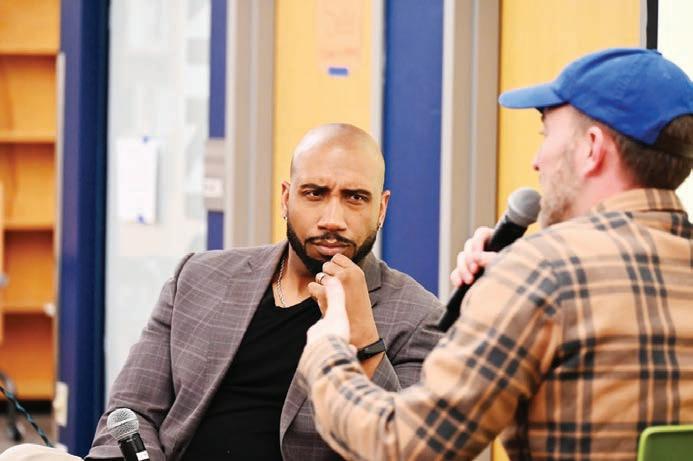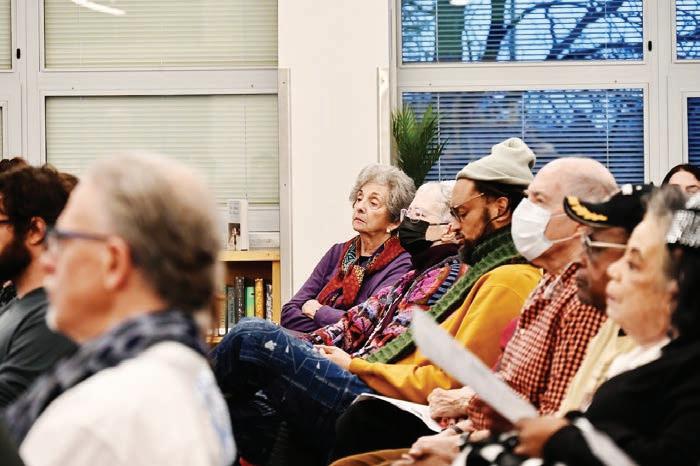
6 minute read
Addressing issues through dialogue

BY BRUCE GOLDBERG SPECIAL TO COLORADO COMMUNITY MEDIA
It seems so long ago, but there was a time that Jewish people and Black people banded together to help push the nation’s civil rights agenda across the nish line.
But that was in the 1960s. Today, the two groups barely seem to know each other and relations are hindered by mistrust, misunderstanding and anger from both communities. It comes during a period of white supremacists increasing attacks — physical and through social media — against both groups.
Still, if Denver’s Caren Press has her way, the two groups gradually will move closer via the organization she recently formed, called “ e Denver Dialogue: A Conversation Between Denver Blacks and Jews.” Press was spurred to action after hearing the anti-Semitic attacks by Kanye West a few months ago.
After a preliminary meeting a few months ago at a Montbello barber shop, the second gathering drew more than 100 people to George Washington High School’s library on March 15.


e group conducted a frank talk about the tensions between the two communities and how to close that gap.
“We want to address some of the issues between the two groups and see if there is a way both can work together to combat white supremacy,” said Press, a retired attorney. “ is grassroots movement is not controlled by any church, syna- gogue, school district or advocacy group. It’s our communities coming together with no agenda other than understanding, reconciliation and combining to ght the white nationalists that want to destroy us both.” e March 15 event was a breakthrough, and some attendees suggested not only more gatherings, but also some with a social bent, such as a barbecue. ere was a frankness, as some Jewish attendees said they didn’t know any Black people, and some Black attendees said the same about Jews. e gathering not only enabled people to learn about others, but also helped debunk some of the supremacists’ messages. at can help open some doors.
White nationalist groups send out a steady stream of fake news lies, and anti-Semitic and racist material and tropes.
“ is group ( e Denver Dialogue) would like to begin a dialogue and see if the relationship can be repaired to at least work together to ght this common adversary,” Press said.

Israel’s relations with Palestine was a hot topic on March 15 — and some of the Black attendees were interested to learn that not all Jews felt the same way about Israel’s actions. Jews in attendance learned that some Black people were horried by what West had to say.
“Anti-Semitism is a real thing,” said Evan Weissman, an activist with Warm Cookies of the Revolution and one of the two guest speakers on March 15. “For a lot of White Jews in the Denver area, it’s not something that’s felt in the same ways as systemic institutional prejudice is. Speaking for White Jewish folk: We need to be involved in racial justice e orts all the time, not just when it a ects Jews in a more direct way.” eo Wilson, a Black man who is the executive director and lead facilitator with ShopTalk Live Inc., was the event’s other speaker.

“I don’t operate from a hopeful frame,” he said. “ is is what is necessary and this is in front of me. It’s necessary to have this conversation, to build this bridge. We can’t move forward unless we understand that this is what we have in common.”
Wilson has been involved in improving relations between African immigrants and Black Americans.
In summary, Press said, “It’s a waste to ght amongst ourselves. We’re putting energy into not trusting others. ere are people that want to annihilate both. It’s dumb; we should be helping each other. We should be understanding each other and reconciling.” board last month that her preschool son met with a speech language pathologist at his school, Holm Elementary, “very few times” during the fall. e therapist left the school in December, she said, and hadn’t been replaced as of February.
To learn more about e Denver Dialogue, contact Caren Press at carenpress@gmail.com.



“I have been told before that as a parent of a special needs child, I will have to ght for everything that my kid gets,” she said. “I am disturbed that I have had to go to so much work to get any communication from the district about their plans and responsibilities to meet my son’s needs.” e Colorado Department of Education ordered DPS to submit a corrective action plan by April 18. e state also awarded the 6-yearold boy compensatory services. e district must provide the boy with 16 hours of speech therapy by December to make up for what he missed.
In a statement, Denver Public Schools said it is aware that “sta ng shortages negatively impact our students’ growth and progress on their goals, which is something we strive to avoid at all costs.” e district said it will work to improve its approach to sta ng and is “committed to addressing the remedies” outlined by the state in the decision.
DPS has until April 25 to come up with a list of the other 1,000 students who missed speech therapy, the decision says. e district must send a letter to parents by May 22 notifying them that their children may get compensatory services, and it must determine if those students are eligible by Sept. 29. Only students who are behind on their goals are likely to be eligible for those services.
Although the district has until next year to provide the compensatory services, the decision encourages DPS to start “as soon as practicable, including during the summer of 2023.” e district is trying to recruit candidates by o ering referral and signing bonuses, as well as incentives for retired therapists to return, the decision says. e district is also working with agencies to hire contract therapists to ll vacancies, and it has started hiring teletherapists.
DPS o cials attributed the missed therapy to a nationwide shortage of speech language pathologists, according to the decision. As of March 1, nine Denver schools had open speech language pathologist positions, the decision says.
Speech language pathologists and


Turn To The Colorado Sun For News Across The State
The Colorado Sun is a journalist-owned, award-winning news outlet that strives to cover all of Colorado so that our state — our community — can better understand itself. In this way, The Sun contributes to a more vibrant, informed and whole Colorado.
The Sun, launched in 2018, is committed to fact-based, in-depth and non-partisan journalism. It covers everything from politics and culture to the outdoor industry and other specialized service providers — a category that includes school psychologists, counselors, social workers, and nurses — have been raising the alarm for years about a culture of too few sta .
In August, longtime Denver speech therapist Jenni Scobey told the school board she was worried about “the dire state of the speech department in the Denver Public Schools.”
“One of the few new employees who chose to join our team shared that colleagues in our eld that previously worked in DPS have warned them not to work in the district, stating that they were underpaid, undervalued, and overworked,” Scobey said.
Michelle Horwitz, a bilingual speech language pathologist, said she spent most of the rst day of school in August “creating a coverage system for 40 schools that do not have a speech language pathologist. Me, an educator on the ground, creating a system so we can try to scrape together our department and pull more people thinner in order to cover these vacancies.”
“We need change,” she said.
Pam Bisceglia, the executive director of Advocacy Denver, an organization that advocates for people with disabilities and their families, led the complaint on behalf of the education.
Now, The Colorado Sun co-owns this and other Colorado Community Media newspapers as a partner in the Colorado News Conservancy. The Sun is CCM’s partner for
6-year-old boy. She said the decision points to the need for a culture shift in DPS.
“Denver Public Schools has lost truly some of the best and brightest general education teachers, special education teachers, and providers,” she said. “ e culture is not a good culture.”
Missed services have real consequences for students, too. As the school year went on and the 6-yearold boy who uses the AAC device missed more and more speech therapy, he began to act out by pulling hair, pushing classmates, and hitting teachers, the decision says.
“Historically, his behaviors often stem from frustrations around communication,” it says.



One bright spot in his year was when the district-level speech therapist spent an hour in the boy’s classroom in mid-February. e speech therapist taught his kindergarten classmates about AAC devices, modeled how to use them, and let them try the devices for themselves.
“ is was the best day [student] has had all year,” the decision says, “and he even volunteered to participate in a lesson later that day.” is story was originally published by Chalkbeat. Sign up for their newsletters at ckbe.at/newsletters statewide news.
For Colorado Sun stories, opinions and more, and to support The Sun’s misssion as a member or subscriber, visit coloradosun. com.










